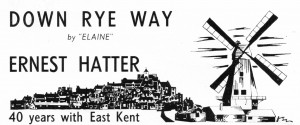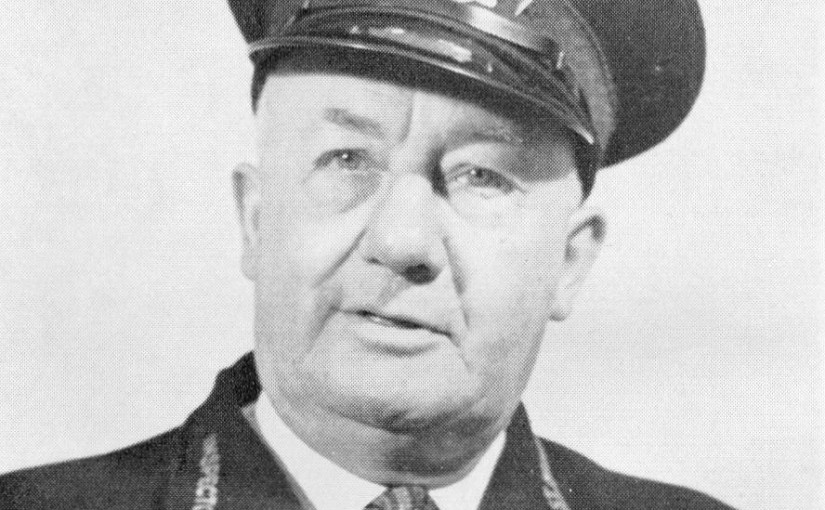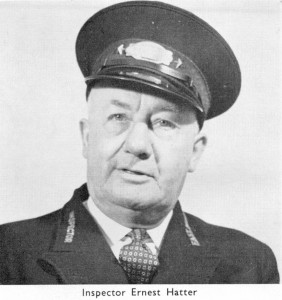 40 years with East Kent Born in Cinque Ports Square, Rye in 1900, Ernest Hatter, one of a family of nine children, was educated at Mermaid Street School. The cottage where he spent his childhood was one of many situated behind where the cinema now stands and has since been pulled down. Leaving school at the age of fourteen he started working at Freeman, Hardy and Willis’s shoe shop, but deciding he was not cut out for this work he left after only a fortnight. He moved to London where he had various jobs in hotels working &ther in the kitchen or as a waiter, he spent a couple of years in London before coming back to Rye in 1916. During the next year he had several jobs. Firstly he tried the Baking Trade—working for Webbs, then a post at Delves furniture shop and towards the latter end of 1917 he went over to driving horse cabs for Wright and Pankhurst who then owned the George Hotel Stable. At this time a coach and four used to ply between Hastings and Rye and the George was the coach house—A pair horse bus, “The Times” ran a once a day service to Tenterden. He stayed with Wright and Pankhurst until he joined the army.
40 years with East Kent Born in Cinque Ports Square, Rye in 1900, Ernest Hatter, one of a family of nine children, was educated at Mermaid Street School. The cottage where he spent his childhood was one of many situated behind where the cinema now stands and has since been pulled down. Leaving school at the age of fourteen he started working at Freeman, Hardy and Willis’s shoe shop, but deciding he was not cut out for this work he left after only a fortnight. He moved to London where he had various jobs in hotels working &ther in the kitchen or as a waiter, he spent a couple of years in London before coming back to Rye in 1916. During the next year he had several jobs. Firstly he tried the Baking Trade—working for Webbs, then a post at Delves furniture shop and towards the latter end of 1917 he went over to driving horse cabs for Wright and Pankhurst who then owned the George Hotel Stable. At this time a coach and four used to ply between Hastings and Rye and the George was the coach house—A pair horse bus, “The Times” ran a once a day service to Tenterden. He stayed with Wright and Pankhurst until he joined the army.
WITH THE MIDDLESEX REGIMENT During the latter part of the First War he served with the Middlesex Regiment in Germany and he was there when the first peace was signed in 1918. On the 10th April, 1920, he was demobbed from the ~.rmy. Mr. Hatter went back to London as a Bar Man for the next twelve months. Then, once again, he returned home to Rye where he helped to put the drains in the first council houses built in Rye at Cadboro. In his next job he received 28 shillings and 10 pence per week. For this he had to walk to Pett every day erecting groynes for sea defence. The next three years were spent with the East Kent bus company as a cleaner then, in 1927 Mr. Hatter xvent out on the road as a conductor. For twenty years he wielded his ticket machine on all the local routes and became a well known personality to East Kent travellers. When Mr. Hatter first started as a conductor, he recalls there being a Tollgate in Winchelsca road and the buses had to pay a shilling a journey to go along there, but there were so many pot holes in the road which caused them to lose nuts and bolts that is was hardly worth their while. At one time the Harbour road was so bad that they had to stop services until it was repaired. In those days charabancs were used—starting from the Cinema. During the Second World War the bus company took three of the conductors off the routes for more important work. So Mr. Hatter spent two years cf the war with Spun Concrete at Rye Harbour. He was elso an active member of the Home Guard. Ernest Hatter was married in 1926, but lost his wife during the second war, he re-married after twelve months to Lillian Perry who lost her husband in the war.

